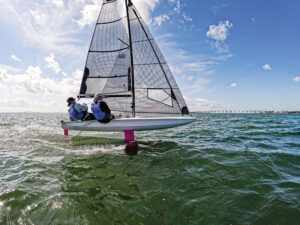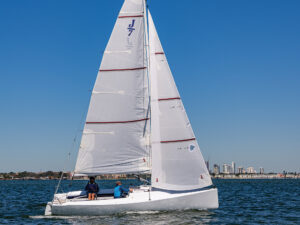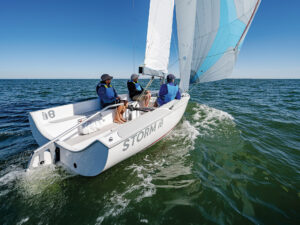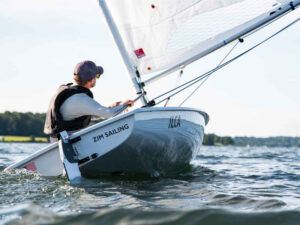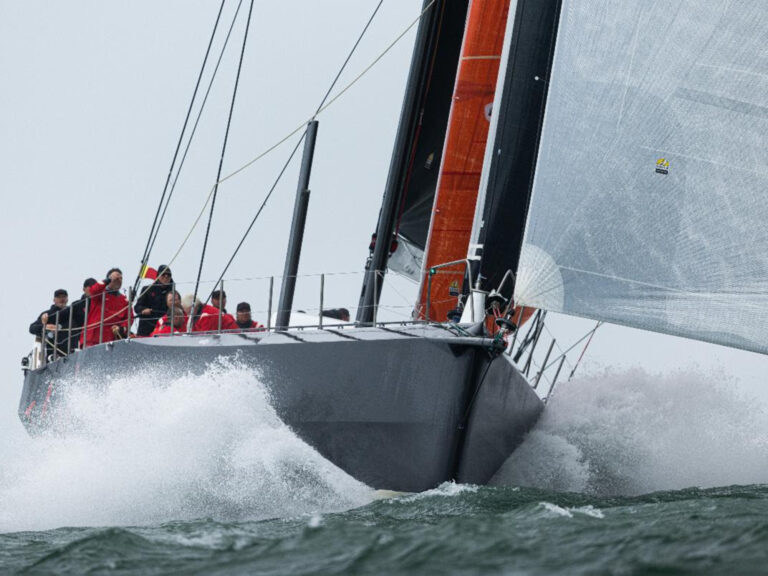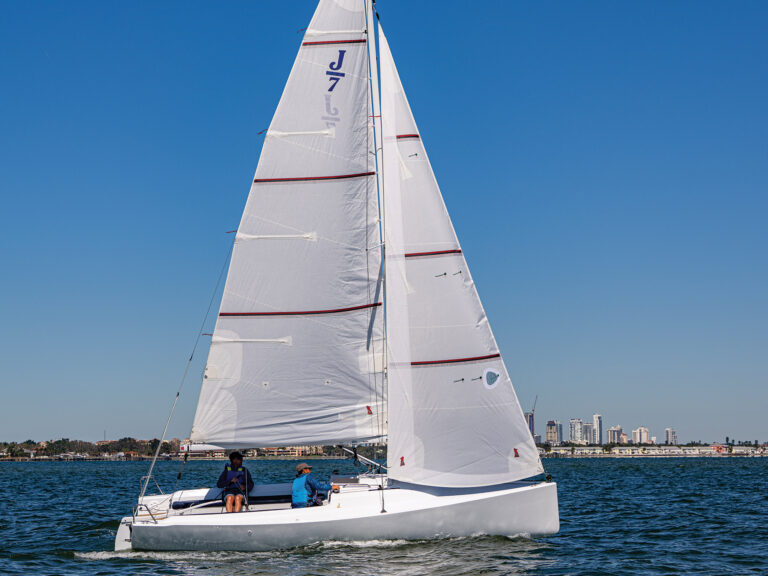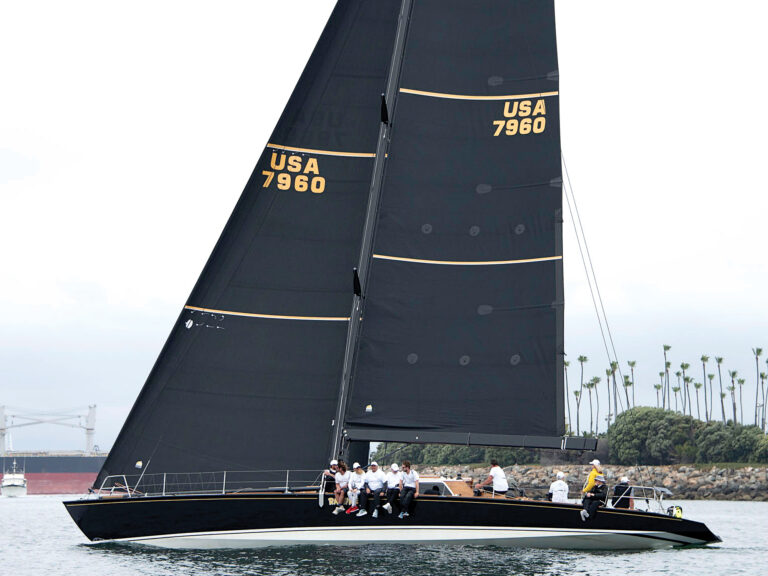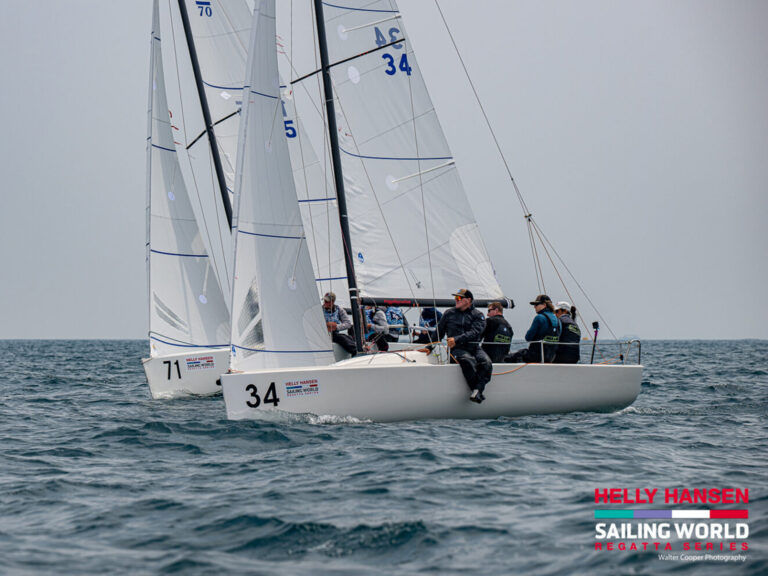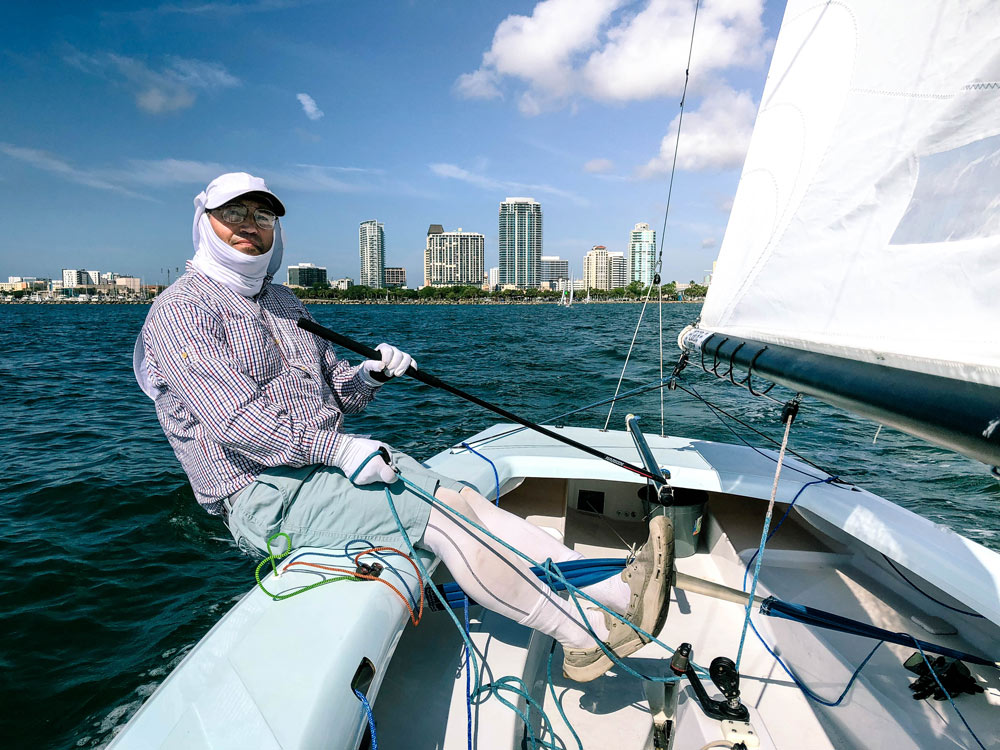
Tom Allen is standing precariously on the bow of his Lighting in the middle of Miami’s Biscayne Bay. He has both hands on a spare piece of line that he’s wrapped around the tip of a bent spreader. Right about now, he’s hoping his Sperry Top-Siders have as much grip as advertised, as he is about to throw his weight backward in an attempt to straighten the stubborn piece of aluminum. After a few jerks of the line, the spreader straightens out nearly back to its original shape. Checking it will be another thing to add to Allen’s list when he gets off the water.
With the repair complete, Allen barely catches his breath before a competitor sails by in search of a toolbox. Allen’s includes everything short of a circular saw. He graciously passes it off. After the first race, yet another team sails by. They point to a large hole near the stern and ask Allen if it’s safe to continue racing. With no structural damage, they continue to race. In this breeze, taking on a little extra water doesn’t hurt.
Once racing is over and the fleet’s celebratory dinner begins, Allen is nowhere to be seen. He’s still in the parking lot putting the final touches on his repair. Most attendees are in cocktail attire but Allen is sporting a respirator and Tyvec suit. This is the second hole he’s repaired this week, and he’s determined for the team to make the starting line again tomorrow.
“He is so willing to put the class on his back, he can never do enough for you,” says Bill Faude, who balances Lightning sailing with his marketing duties at Harken. “There’s no arrogance in him whatsoever, and he’s always happy to help. If he didn’t do what he is willing to do, we wouldn’t go sailing.”
Once racing is over and the fleet’s celebratory dinner begins, Allen is nowhere to be seen. He’s still in the parking lot putting the final touches on his repair. Most attendees are in cocktail attire but Allen is sporting a respirator and Tyvec suit. This is the second hole he’s repaired this week, and he’s determined for the team to make the starting line again tomorrow.
“He is so willing to put the class on his back, he can never do enough for you,” says Bill Faude, who balances Lightning sailing with his marketing duties at Harken. “There’s no arrogance in him whatsoever, and he’s always happy to help. If he didn’t do what he is willing to do, we wouldn’t go sailing.”
“We teach them what is important about this class, not just that it’s an ugly square 19-foot flower box pounding the chop,” says Faude. “It’s a tribe and we welcome them. We hug them, we house them, we help them put their boat together, we pay for them to come to events.” Allen comes from a long lineage of Lightning sailors himself. His grandfather, then his mother and father were Lightning sailors. Tom Allen Senior was a renowned competitor and founder of Allen Boatworks and passed his love for the class to his son.
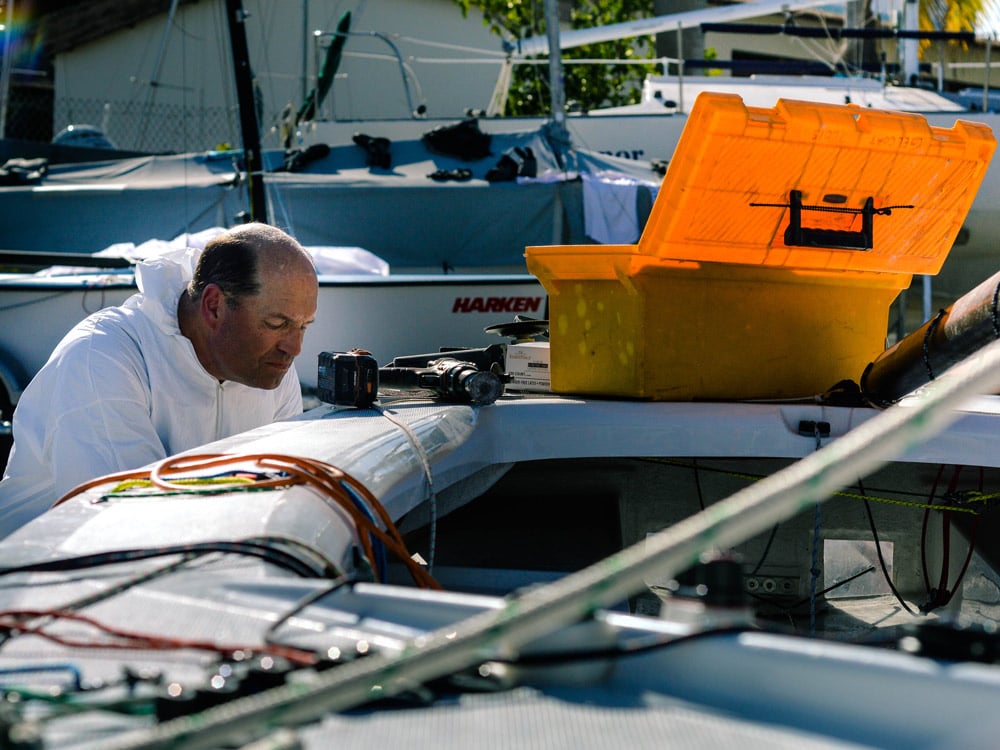
Allen’s own boat, No. 9, is a testament to that legacy. The original number nine was built by his father, then traded back to the shop when Allen was 14 years old. His father thought it would be good for Allen to learn how to take care of a wooden boat. Even as a youngster, Allen enjoyed having something unique to preserve. One night long ago, No. 9 was stolen from the backyard of Allen Boatworks by kids, allegedly on a mission to sink the boat. They launched it and threw boulders at it, until beating it into an irreparable state.
Ten years later, long after No. 9 was retired, the class changed its rules requiring sail numbers match hull numbers. Allen knew exactly what number his new boat would carry.
“I continued to use it because it was one of the early boats my father built out of wood,” he says. “I grew up sailing it, but also because I don’t like having to change numbers when I sell stuff. Now everybody knows me and they can find me easily.”
This is typical of Allen’s character: as a guy who makes himself readily available to anyone in the class when assistance is required. “He’s carved this alternative path from his father,” says Faude. “His father was a competitor first, but when you buy a boat from Tommy you get a fast boat and his nurturing spirit for the class.“
Everyone in Miami has benefitted from the Allen’s knowledge or experience one way or another Each morning before racing, his crew gets a head start rigging his boat while he races around helping competitors fix things or adjust their tune. It’s well-known that Allen usually forgets to invoice for his work. While the Lightning class may be his livelihood, it’s also his legacy.
“My grandfather and mother were great sailors but my father, who lived down the beach, no one in his family sailed,” says Allen, explaining the family’s roots in the class. “His father was a doctor, and a golfer, and he wanted my father to be a golfer. But he didn’t want to be a golfer, he was OK to hang around and play on the links and caddy for others but he wanted to go sailing, he saw all the boats out there and decided that was for him. He wanted that for a long time.”
Allen has school papers from when he was six years old, when he was learning to write cursive, and the penmanship is prophetic. “I wrote, ‘‘I want to be a boat builder.’”
After the Buffalo [New York] Canoe Club’s fleet of Knarrs were destroyed in a fire, the Lightning was introduced and Tom Allen Senior secured his place in the fleet. Allen Senior dominated the class, and eventually built himself a boat, despite having no formal knowledge of wood working. His first boat was fast, he won many races, and others soon took notice. Before long, Allen boat-works was born.

Allen Junior grew up around the shop, spending his summers working for his father and honing his own skills in the Lightning. “When I was a young kid, I didn’t learn to sail with my father because he had the pick of whoever he wanted to sail with. My mother was excellent, even my sister Jane, the eldest. I crewed for him a couple of times, but it wasn’t until I went out and learned to sail with someone else that I became good enough that I could crew for him.”
After earning his degree at Michigan State, Allen Junior joined his father in business but with a new philosophy of engineering boats to last so they could be passed along, designing not just for the initial owner, but for the second or the third owner as well.
When he was a kid, he says, he used to read all the magazines and he was struck by an advertisement for a Melges-built E Scow. The ad, he says, touted, “new and improved stiffness, a boat that will last for four years.”
“Back in the day, an E scow was 12 to 14 thousand dollars and a Lightning was six thousand. I was like, what do you mean, you have to replace it in 4 years?
“I was stunned,” he says. “That was the change for me.”
Today he acknowledges his business is selling boats and repairing boats. Most of the guys in a small one-design fleet, their business is the fleet,” he says. “The class does much better, if you have a longer lasting boat that you don’t have to replace.”
When it comes down to it, Allen’s focus is at the heart of the class. Everything he does contributes to its longevity and health of its tribe. “The Lightning class is really good at it,” he says. “It’s not just helping people, it’s saying we care about you, we care you are having a good time. You really have to get people in young, so they will continue sailing. I don’t care if it’s a Lightning or something else, at least expose them to it.”
He’s witnessed numerous other classes die before their time. Once people stop buying new boats, he says, the class implodes.
However, as long as Allen Boat Co. exists, the Lightnings will certainly continue to see success. From straightening out an aluminum shroud to building new hulls, Tom Allen’s footing in the Lighting is sure.

